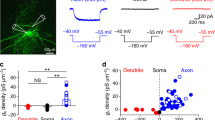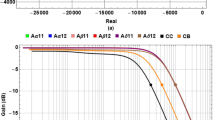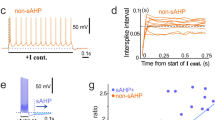Abstract
Two voltage-dependent changes in ionic permeability are responsible for the action potential in squid giant axon1. The depolarization phase of the action potential is due to an initial increase in sodium ion permeability, and repolarization is primarily the result of a later increase in potassium permeability. However, voltage-clamp experiments on mammalian peripheral nodes of Ranvier indicate that potassium conductances (gk) may be minimal or lacking for intact mammalian peripheral myelinated axons2–4. Repolarization for these fibres has been explained in terms of a rapid sodium inactivation and large leakage current3. When the myelin around these fibres is acutely disrupted, an immediate and prominent gk appears4. Following demyelination, gk blocking agents have been shown to reduce late outward currents that are not present in normal myelinated fibres5. This suggests that K+ channels are present in the axonal membrane under the myelin but are ‘masked’ in normal peripheral myelinated axons. Previous studies have not investigated the presence or role of K+ channels in central myelinated axons. We here establish that gk is not detectable in mammalian dorsal column axons.
This is a preview of subscription content, access via your institution
Access options
Subscribe to this journal
Receive 51 print issues and online access
$199.00 per year
only $3.90 per issue
Buy this article
- Purchase on Springer Link
- Instant access to full article PDF
Prices may be subject to local taxes which are calculated during checkout
Similar content being viewed by others
References
Hodgkin, A. L. & Huxley, A. F. J. Physiol., Lond. 117, 500–544 (1952).
Horakova, M., Nonner, W. & Stämpfli, R. Proc. int. Un. physiol. Sci. 7, 198 (1968).
Chiu, S. Y., Ritchie, J. M., Rogart, R. B. & Stagg, D. J. Physiol., Lond. 292, 149–166 (1979).
Chiu, S. Y. & Ritchie, J. M. Nature 284, 170–171 (1980).
Sherratt, R. M., Bostock, H. & Sears, T. A. Nature 283, 570–572 (1980).
Kocsis, J. D., Malenka, R. C. & Waxman, S. G. Brain Res. (in the press).
Kocsis, J. D., Malenka, R. C. & Waxman, S. G. Soc. Neurosci. Abstr. (in the press).
Pelhate, M. & Pichon, J. Physiol., Lond. 242, 90–91P (1974).
Nicholson, C. G., ten Bruggencate, G. & Senekowitsch, R. Brain Res. 113, 606–610 (1976).
Llinás, R., Walton, K. & Bohr, V. Biophys. J. 16, 83–86 (1976).
hille, B. J. gen. Physiol. 50, 1287–1302 (1967).
Shapovalov, A. I. & Kurchavyi, C. G. Brain Res. 82, 49–67 (1974).
Sugimori, M., Preston, R. J. & Kitai, S. T. J. Neurophysiol. 41, 1662–1675 (1978).
Schwartzkroin, P. A. & Prince, D. A. Brain Res. 85, 169–181 (1980).
Author information
Authors and Affiliations
Rights and permissions
About this article
Cite this article
Kocsis, J., Waxman, S. Absence of potassium conductance in central myelinated axons. Nature 287, 348–349 (1980). https://doi.org/10.1038/287348a0
Received:
Accepted:
Published:
Issue Date:
DOI: https://doi.org/10.1038/287348a0
This article is cited by
-
Oligodendroglia are emerging players in several forms of learning and memory
Communications Biology (2022)
-
Pluralistic roles for glycogen in the central and peripheral nervous systems
Metabolic Brain Disease (2015)
-
Two-pore domain potassium channels enable action potential generation in the absence of voltage-gated potassium channels
Pflügers Archiv - European Journal of Physiology (2015)
-
Astrocyte glycogen as an emergency fuel under conditions of glucose deprivation or intense neural activity
Metabolic Brain Disease (2015)
-
The node of Ranvier in CNS pathology
Acta Neuropathologica (2014)
Comments
By submitting a comment you agree to abide by our Terms and Community Guidelines. If you find something abusive or that does not comply with our terms or guidelines please flag it as inappropriate.



